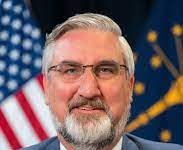By Erica Irish
TheStatehouseFile.com
INDIANAPOLIS — The soybean has become a de facto symbol of the Indiana farmer.
Shuttles carrying families from the south to the north venues of the Indiana State Fair, a hub for state agriculturalists, are emblazoned with signs that read “powered by soy diesel.†Near the Indiana Soybean Alliance’s Glass Barn, a half-bean, half-man sculpture — “Bennie the Bean†— greets passerby with a cartoonish smile.
And for the agriculturalists who flock to the fairgrounds annually for exhibitions and other programs, the soybean is often a main source of revenue for Indian’s farming families.
But soybean prices have fallen in the month since President Donald Trump announced his administration would impose billions of dollars in tariffs on aluminum and steel exports to China, Mexico, the European Union and Canada. The countries targeted, particularly China, retaliated soon after the announcement, with their lashing out aimed at the United States’ agriculture industry.
That is only the beginning, experts warn, considering China’s past reliance on U.S. soybeans. The U.S. Department of Agriculture, for example, reported that $12.3 billion worth of soybeans were exported to China in 2017 alone.
Austin Berenda, 18, saw the brunt of the changes earlier this summer.
He grew up on a 2,000-acre farm growing soybeans, corn, and popcorn and raising cattle in Benton County, near the Illinois-Indiana border. He now serves as treasurer for the Indiana division of the National FFA Organization, or what was the Future Farmers of America.
On his lunch break Thursday at the FFA Pavilion on the fairgrounds, an area that includes a country store and mini-golf, Brenda explained that his parents, who generate all of their combined income from their farm, knew they needed to act fast as trade tensions hit a fever pitch.
“My family panicked,†he said.
Rather than continue to grow soybeans they had contracted for the season, the family sold all of their soybean crops ahead of time to ensure that, when the prices dropped from retaliation from foreign countries, they could salvage some money.
“They claim it’s a long process, and if we stick it out it’ll eventually be better,†Berenda said, referring to Trump’s administration. “But that’s so hard for a farmer to see when he takes less money, and when he has to depend on government assistance to stay afloat.â€
The 18-year-old referred to the president’s promised $12 billion in reimbursements to farmers, some of which can be directly pocketed by soybean growers.
Those subsidies, Brenda added, might sharpen what he called the “double-edged sword†leading the trade war — they won’t help farmers at home build a better relationship with their consumers, who might be wary of farmers receiving taxpayer dollars.
And connecting with the public has worn down agriculturalists for some time, the officers and other state fair agriculturalists agreed.
Sami DeLey, this year’s president of the Indiana FFA, said the public is needlessly afraid of GMOs, or genetically modified organisms, which have become commonplace in crops in recent years. She said she is on a mission to end the stigma.
“It’s a very touchy subject,†she said. “But we as agriculturalists just need to inform people that our food is safe, and that’s potentially the best way to produce food.â€
Gabi Reese, a 21-year-old student enrolled in Purdue University’s agricultural education program, is on a similar path.
Randy Price, a former optometrist, was in attendance. He agreed that it is important for the public to understand farmers’ growing practices, which often require high-tech gear and extensive planning.
When asked about Trump’s tariffs, he said they are a positive sign for all Americans, including farmers.
“[Trump] wants to help the ones who get hit the hardest,†he said. “He’s shooting for total free trade.â€
Randy Price was accompanied by his wife, Roseanne Price, at the event. They also attended to visit Reese, one of their grandchildren.
The Lebanon couple agreed that the president’s intentions are good and that the tariffs will result in a better future for the country.
“We’ve never fought back until now,†Roseanne Price added. “That’s because, until now, we’ve never had a president that realized we needed to.â€
For those on the front lines of Indiana agriculture, however, the future is uncertain.
“We’re probably set for this year, as long as we have a good crop,†Berenda said. “But the years to come are scaring us.â€
FOOTNOTE: Erica Irish is a reporter for TheStatehouseFile.com, a news website powered by Franklin College journalism students.






